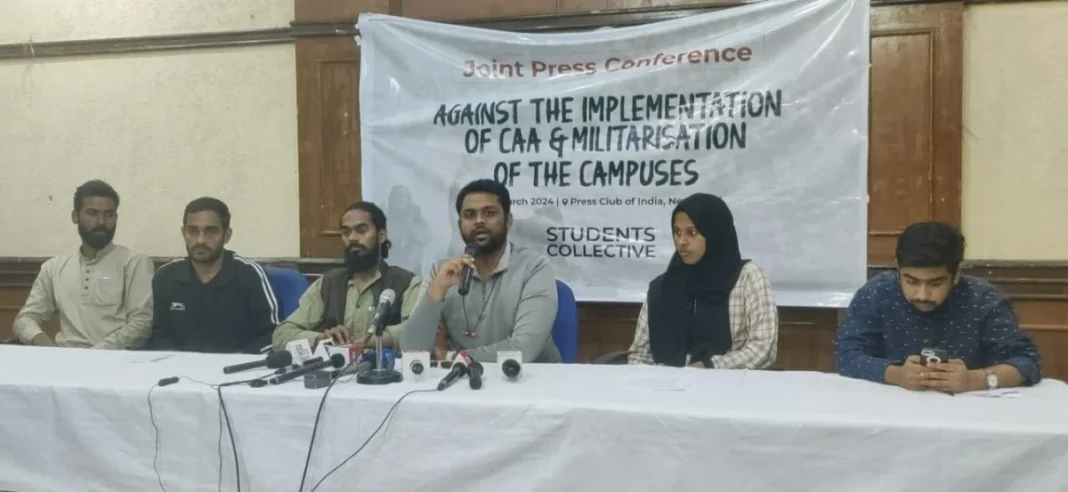University Leaders and Activists Condemn CAA Implementation as Violation of Constitutional Values
Abdullah Salam
NEW DELHI- In a resolute stand against what they perceive as a threat to the secular fabric of India, students from various universities and organizations across the nation have united to demand the immediate repeal of the Citizenship Amendment Act (CAA). The recent notification issued by the Government of India to implement the CAA has sparked widespread condemnation and protests among student communities, who view the law as discriminatory and divisive.
The Students Collective, a coalition of student leaders representing different universities and organizations, vehemently opposes the implementation of the CAA, citing it as a direct affront to the fundamental principles enshrined in the Indian Constitution. The decision to grant citizenship based on religious grounds while excluding a major minority, particularly Muslims, is seen as a violation of principles of equality, secularism, and inclusivity.
At a press conference convened at the Press Club of India, representatives including Mohd Alfauz, Wakeel Ahmad, Hadya, Abdullah Faiz, Basanjit Kumar, and Pushpindera Rao expressed their condemnation of the CAA’s implementation. They highlighted the collective sentiment that the CAA undermines the secular ethos of India by excluding Muslims on religious grounds.
The protests against the CAA have been met with severe repression from state authorities, with universities such as Jawaharlal Nehru University (JNU) and Jamia Millia Islamia witnessing intense clashes between protestors and law enforcement. Activists like Umar Khalid and Sharjeel Imam have been unlawfully detained under stringent laws, triggering outrage among protestors.
At demonstrations held across universities, student leaders reiterated their opposition to the CAA, labeling it as an Islamophobic law that violates the principles of equality enshrined in the Indian Constitution. They criticized the decision to grant citizenship based on religious criteria, asserting that it undermines the secular values of the nation.
Student leaders from organizations like the Students Islamic Movement of India (SIMI), All India Students Association (AISA), and Delhi University joined forces to denounce the CAA at a joint press conference. They announced plans for a united movement against what they referred to as the “Black Law,” emphasizing the need for solidarity in the face of crackdowns on student activism.
During the press conference, Muhammad Al-Fawz stressed the need to end oppression and harassment on campuses, condemning the government’s attempts to impose a particular ideology on citizens. He labelled the CAA as anti-democratic and called for its immediate scrapping.
Ahmed, a representative of Birsa Ambedkar Phule Students’ Association, condemned the CAA as a shameful act of dirty politics and pledged to continue protesting against it. He emphasized the importance of democracy in allowing every community to flourish and criticized the polarizing nature of the law.
Hadiya, a student leader from Delhi University, reiterated the resolve of students to oppose the CAA despite facing harassment and arrests by the government. She condemned police brutality and reaffirmed the commitment of Delhi University students to continue their protests against the discriminatory legislation.
Basanjeet Kumar, general secretary of AISA, described the CAA as a black law and vowed to continue protesting until it is repealed. He emphasized the need for nationwide protests to oppose the discriminatory nature of the law and uphold the principles of democracy and secularism.
The protests against the CAA signify a broader struggle for the preservation of constitutional values and the protection of minority rights in India. Despite attempts by authorities to suppress dissent, students remain steadfast in their demand for the repeal of the discriminatory legislation, reaffirming their commitment to upholding the secular fabric of the nation.
As voices against the CAA grow louder and more unified, the government faces mounting pressure to reconsider its implementation and uphold the principles of equality and inclusivity enshrined in the Indian Constitution.

